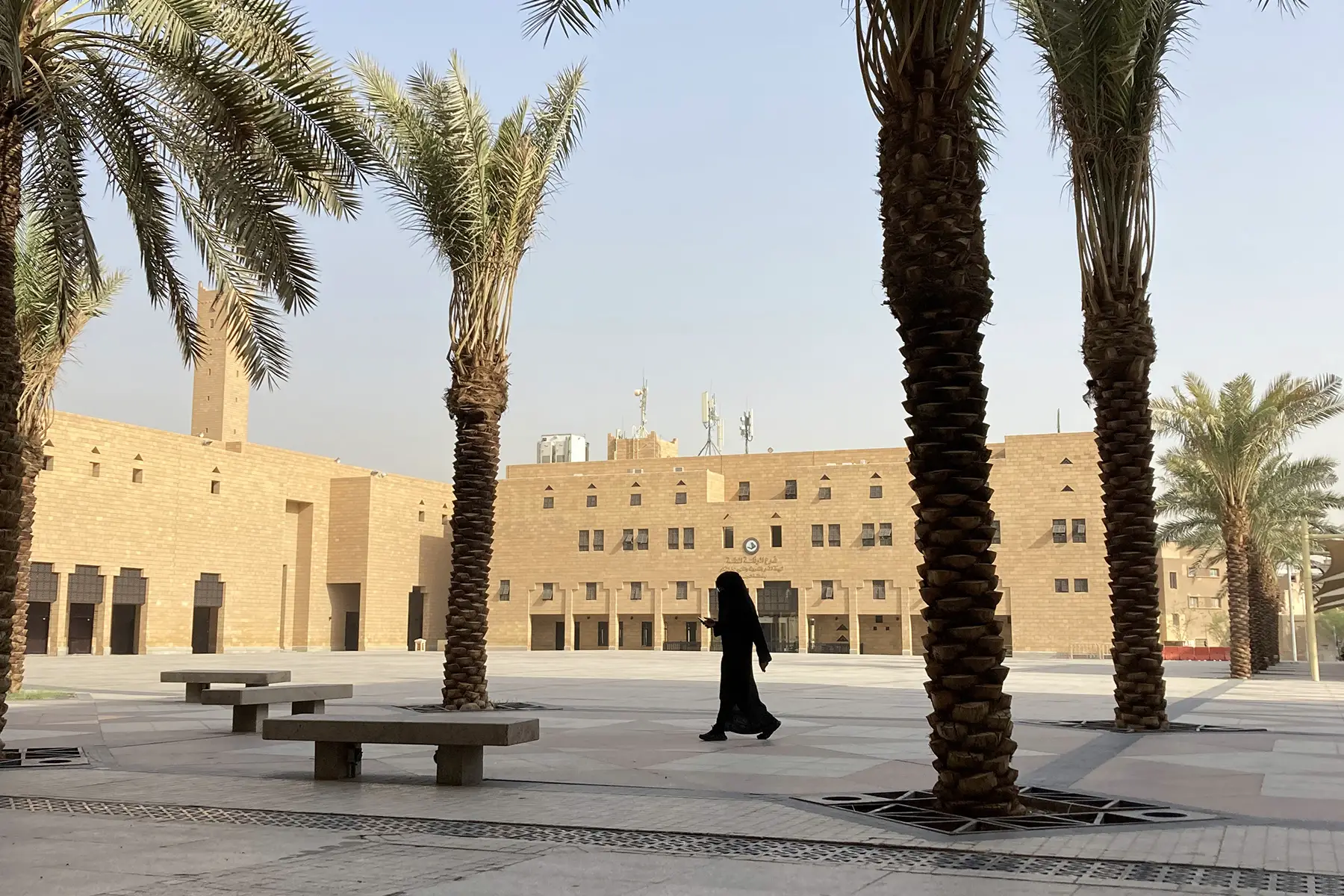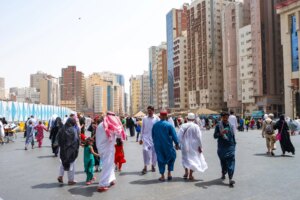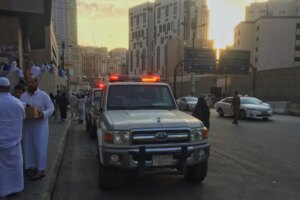A newcomer to Saudi Arabia might wonder what to expect news-wise upon arrival. With some of the world’s toughest restrictions on freedom of expression, you may have concerns about accessing reliable information.
Below, you’ll find a detailed exploration of Saudi news media, including English-language sources, and learn how to avoid misleading content.
- The media in Saudi Arabia
- Where to get the news in English in Saudi Arabia
- List of newspapers in Saudi Arabia
- List of TV and radio news channels in Saudi Arabia
- Social media news sources in Saudi Arabia
- Alternative news and citizen journalism in Saudi Arabia
- Tips for getting reliable news in Saudi Arabia
- Fact-checking the news in Saudi Arabia
- Useful resources
Ground News
Get every side of the story with Ground News, the biggest source for breaking news around the world. This news aggregator lets you compare reporting on the same stories. Use data-driven media bias ratings to uncover political leanings and get the full picture. Stay informed on stories that matter with Ground News.
The media in Saudi Arabia
Some internationals may find that the Saudi news landscape differs from what they’re used to. So don’t expect to spend your lazy Sunday mornings at the dining table, poring over broadsheet supplements. Water cooler conversations over sensational headlines? Forget about it.

Saudi Arabia’s media is one of the world’s most restricted. Because content is heavily censored, it is rather sanitized and colorless – a shame, because it doesn’t reflect the diversity of Saudi society that has been emerging. That said, local newspapers offer a window into the Kingdom’s leadership, customs, culture, politics, economy, and view of its place in the world.
News censorship in Saudi Arabia
Prepare to be disappointed if you’re into vibrant political discourse in the media. The media in Saudi Arabia reflects the lack of political parties, presenting a limited range of viewpoints.
The government keeps a watchful eye on content, and publishers and broadcasters self-censor. Indeed, official media are loyal to the royal family, the government, and the establishment and emphasize maintaining social harmony.
There are 10 daily newspapers in the Kingdom: eight in Arabic and two in English. Some are now online only. Don’t bank on finding an English print newspaper outside Riyadh, Jeddah, and the Eastern Province.
TV and radio news are similarly austere. Terrestrial ‘free-to-air’ TV is a mix of bland news and light entertainment. Tuning into international news channels is one way to break the monotony.
Saudi mainstream news only publishes and broadcasts in Arabic and English, while a handful of outlets cater to Urdu and Malayalam-speaking communities. With a basic understanding of Arabic, you can brush up on your language skills by following local channels. Arabic news channels and platforms often offer better insight than their English equivalents.
Recent developments
Saudi Arabia’s media landscape is changing. Only 19% of the Saudi population gets news from a print newspaper, while 18% get news from the radio and 40% from TV.
Where to get the news in English in Saudi Arabia
Newspapers
Saudi Arabia has two English-language newspapers: Arab News and Saudi Gazette.
Arab News
Arab News is a broadsheet that was founded around half a century ago. Its print circulation is just over 50,000, a far cry from its peak. The newspaper is printed and headquartered in Saudi Arabia’s capital, Riyadh, but it is distributed nationwide (although in practice, you’ll mainly see it in Riyadh, Jeddah, and the Eastern Province).
As with all Saudi newspapers, Arab News does not challenge the country’s leadership. Although it offers interesting analysis and opinions from respected Saudi and regional figures, don’t expect hard-hitting investigative journalism.
Saudi Gazette
Saudi Gazette is the country’s second English-language newspaper, providing online-only content. Its articles are concise but pretty staid. It contains opinion and commentary but little to no detailed analysis of local issues.

Supermarkets popular with expats (Tamimi Markets, LuLu, and Carrefour, for example) in the main cities occasionally stock English-language print newspapers from the UK and US. However, they’ll be a day or two out of date before they hit Saudi shelves and won’t come cheap.
News TV stations
Much like the national newspaper scene, English-language TV or radio news is scarce.
- Saudi Two: Available ‘free-to-air,’ this station broadcasts news bulletins throughout the day. It also provides the usual mix of imported (and censored!) drama and middle-of-the-road light entertainment.
- International satellite channels: satellite TV is extremely popular in the Kingdom, so the usual array of international channels is readily available. Home packages from providers such as Saudi Telecommunications Company (STC) usually provide networks like:
News websites and social media
Social media is the ‘go to’ news source for half Saudi Arabia’s population, and a third of people access it on a tablet or mobile device. Two English-language newspapers in Saudi Arabia offer online content.
- Arab News – this local news website is functional rather than particularly insightful. The website is easy to navigate, and, as a plus, there’s no paywall and few annoying pop-ups.
- Saudi Gazette
Both newspapers have social media accounts, which enable them to reach a wide audience. However, manage your expectations for meaningful engagement or reasoned debate in the comments sections.
Other online media with Saudi coverage include:
- Al Jazeera – a Qatar-based broadcaster that tends to offer more nuanced coverage of Saudi Arabia and its wider geopolitical context. It also offers thought-provoking opinion.
- Arabian Business – based in Dubai, this portal has a dedicated Saudi section that focuses on economy and business news.
- Middle East Economic Digest (MEED) – a long-established brand covering the region’s economy. The portal also has an interesting section on Saudi Arabia’s huge infrastructure projects.
- Reuters – this global news agency regularly covers Saudi news from its regional Dubai bureau.
- Tradearabia – A Bahrain-based portal focusing on regional business and tender news, including Saudi projects
- Middle East Monitor – promotes itself as an independent news source and sometimes carries Saudi stories. It won the Free Media Pioneer Award at the International Press Institute.
List of newspapers in Saudi Arabia
There are eight Arabic-language newspapers in Saudi Arabia, and there’s little to choose between them in terms of content.
National and regional Saudi newspapers
- Al Bilad – a Jeddah-based publication that was the first newspaper in Saudi Arabia
- Al Eqtisadiah – a business newspaper with print and online editions
- Al Jazirah – a broadsheet daily published in Riyadh with minimal circulation
- Al Madina – a daily newspaper published from Jeddah with limited print circulation
- Al Riyadh – a broadsheet daily published in Riyadh. It also has an English-language website.
- Al Watan – a broadsheet daily published in the southern city of Abha
- Al Yaum – the leading publication in the Eastern Province.
- Okaz – published in Jeddah, its news focuses on the provinces of Hejaz and Asir.
List of TV and radio news channels in Saudi Arabia
The government’s Saudi Broadcasting Authority oversees TV and radio news in Saudi Arabia. There are two main Arabic-language channels offering news:
- Al Ekhbariya – Delivers local, regional, and international news.
- Al Saudiya – Entertainment channel that also broadcasts daily news briefings covering Saudi Arabia and the region.
Meanwhile, local Arabic-language radio news stations include:
In addition to news channels,
- Al Riyadiyah – Arabic-language sports channel showing local first-division (second-tier) and second-division (third-tier) football matches.
- Faillat – advertises events across the Kingdom.
Social media news sources in Saudi Arabia
Saudis are among the world’s most voracious social media consumers. These platforms have become vital for expression and debate in the country. Facebook, Instagram, and X are some of the most popular places for sharing content, and the Kingdom’s news outlets also rely on them to reach the widest possible audience.
Keyboard warriors, beware: the Saudi Communications and Information Technology Commission has strict regulations around shared social media content.
Alternative news and citizen journalism in Saudi Arabia
Although Saudi has some of the world’s most restricted official media, there is a growing community of citizen journalists. They use smartphones and social media to report on issues in the country, providing an alternative source of news and information.
However, as an international, you must tread carefully. This content is heavily monitored, and citizen journalists, bloggers, and social media users have been arrested for allegedly criticizing the royal family or the country’s institutions.
Be careful when liking, sharing, and commenting on this type of content.
Tips for getting reliable news in Saudi Arabia
Saudi news is ‘reliable’ in the sense that it is all officially sanctioned. It’s essential to remember that it reflects the state’s worldview and policies, meaning that you only ever receive one viewpoint on events.
Many news stories contain a common theme, such as Vision 2030, the country’s socio-economic development plan. Many local business, economy, and society news stories reference it.
Another example is the current focus on the Kingdom’s sports investments. Saudi Arabia positions this interest as a way to diversify the oil-dependent economy, as part of Vision 2030. However, foreign media outlets may portray these developments differently.

Indeed, the world is currently taking an interest in Saudi Arabia. The country’s opening up of society, modest improvements in women’s rights, and massive investments in sports are just three areas that have thrust it onto the international news agenda.
Saudi newspapers and broadcasters have their view of these developments, and the international media (many of which don’t have offices or full-time staff in the country) have theirs. Therefore, it’s a good idea to check a variety of sources.
Fact-checking the news in Saudi Arabia
When it comes to fact-checking the news, cross-reference a variety of publications. It’s worth using local sources for ‘breaking news’ and international news platforms to provide analysis and context.
There are no government fact-checking services in Saudi Arabia. Instead, check out independent services such as:
Finally, don’t underestimate the power of word of mouth in a country like Saudi Arabia. Treat what you read and hear with caution and healthy skepticism – get to know and befriend Saudis, and you may find a more authentic, less airbrushed picture of local issues.
Useful resources
- Arab Fact-Checkers Network (AFCN) – an organization supporting fact-checkers in the Arab region
- Freedom House – Saudi Arabia Freedom in the World report
- Ministry of Communications and Information Technology – Saudi government ministry governing communications and technology
- Saudi Press Agency – local news, events, and media





